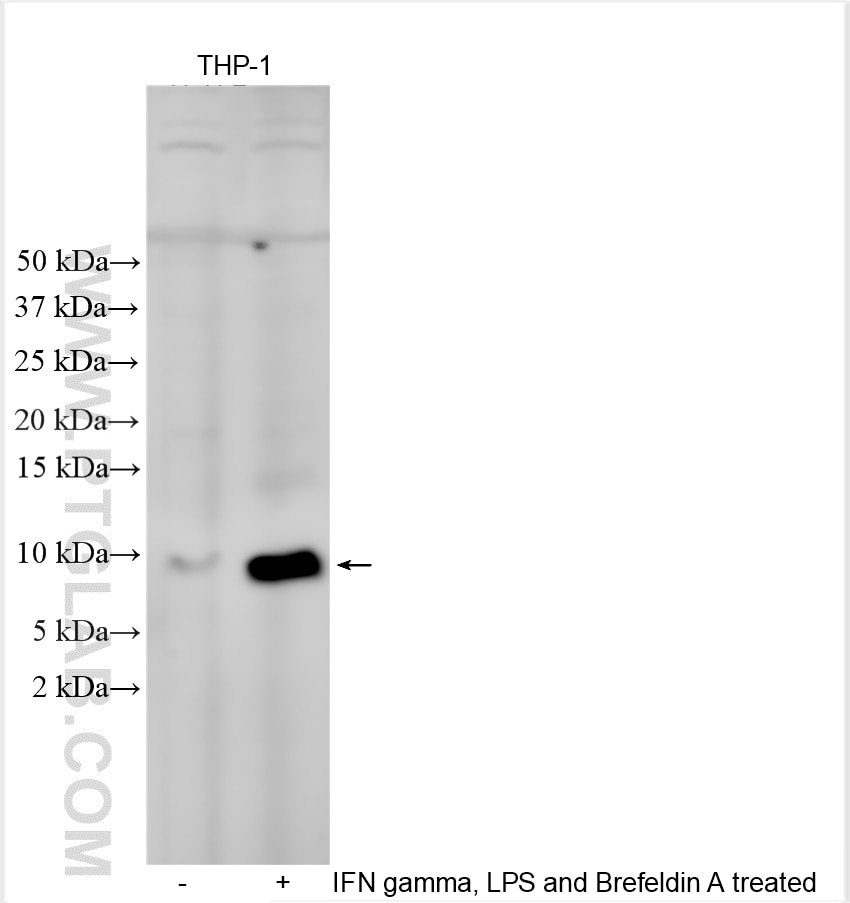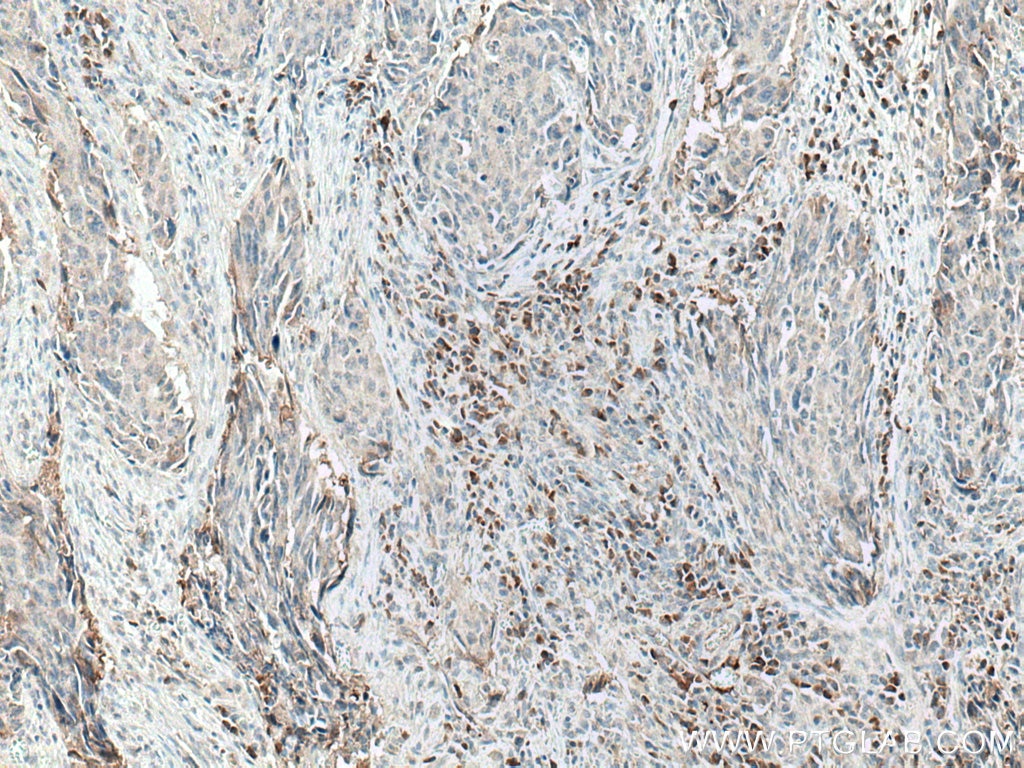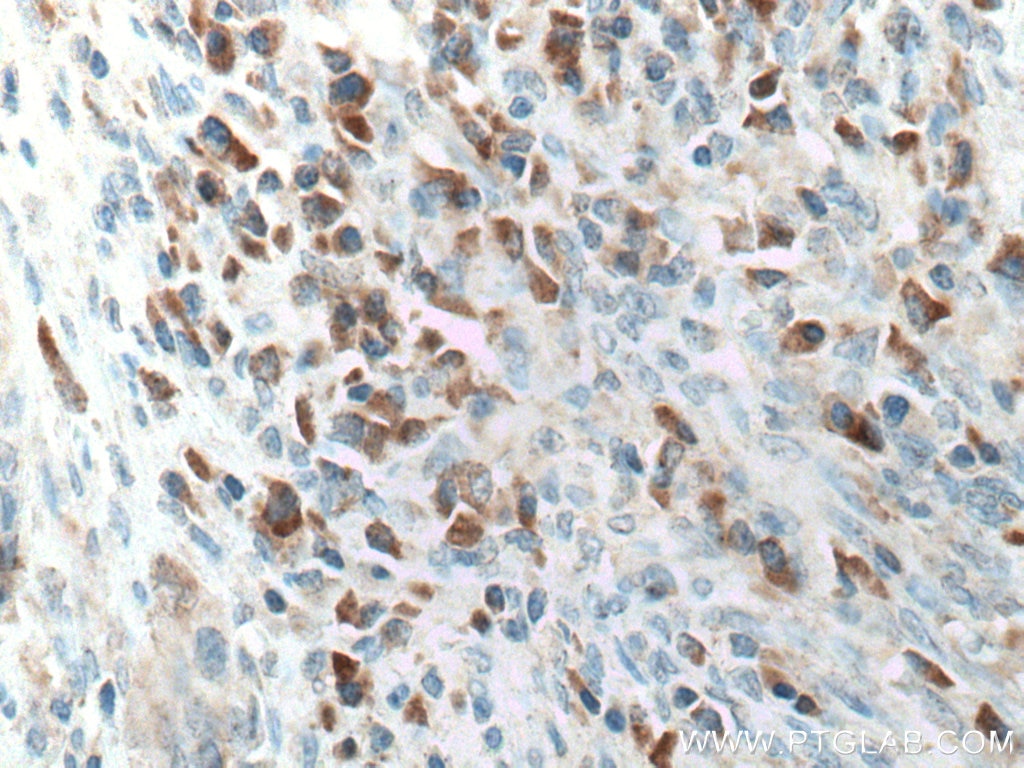Tested Applications
| Positive WB detected in | IFN gamma, LPS and Brefeldin A treated THP-1 cells |
| Positive IHC detected in | human colon cancer tissue Note: suggested antigen retrieval with TE buffer pH 9.0; (*) Alternatively, antigen retrieval may be performed with citrate buffer pH 6.0 |
Recommended dilution
| Application | Dilution |
|---|---|
| Western Blot (WB) | WB : 1:500-1:1000 |
| Immunohistochemistry (IHC) | IHC : 1:50-1:500 |
| It is recommended that this reagent should be titrated in each testing system to obtain optimal results. | |
| Sample-dependent, Check data in validation data gallery. | |
Published Applications
| WB | See 1 publications below |
| IHC | See 2 publications below |
| IF | See 1 publications below |
Product Information
10707-1-AP targets CXCL11 in WB, IHC, IF, ELISA applications and shows reactivity with human samples.
| Tested Reactivity | human |
| Cited Reactivity | human |
| Host / Isotype | Rabbit / IgG |
| Class | Polyclonal |
| Type | Antibody |
| Immunogen |
CatNo: Ag1087 Product name: Recombinant human CXCL11 protein Source: e coli.-derived, PGEX-4T Tag: GST Domain: 1-94 aa of BC005292 Sequence: MSVKGMAIALAVILCATVVQGFPMFKRGRCLCIGPGVKAVKVADIEKASIMYPSNNCDKIEVIITLKENKGQRCLNPKSKQARLIIKKVERKNF Predict reactive species |
| Full Name | chemokine (C-X-C motif) ligand 11 |
| Calculated Molecular Weight | 10 kDa |
| Observed Molecular Weight | 10 kDa |
| GenBank Accession Number | BC005292 |
| Gene Symbol | CXCL11 |
| Gene ID (NCBI) | 6373 |
| RRID | AB_2088022 |
| Conjugate | Unconjugated |
| Form | Liquid |
| Purification Method | Antigen affinity purification |
| UNIPROT ID | O14625 |
| Storage Buffer | PBS with 0.02% sodium azide and 50% glycerol, pH 7.3. |
| Storage Conditions | Store at -20°C. Stable for one year after shipment. Aliquoting is unnecessary for -20oC storage. 20ul sizes contain 0.1% BSA. |
Background Information
CXCL11, also known as IFN-inducible T-cell α-chemoattractant (I-TAC), is a member of the ELR-negative CXC chemokine family. It is produced by various cells including leukocytes, fibroblasts, and endothelial cells upon stimulation with interferons (IFNs). CXCL11 signals through the chemokine receptors CXCR3 and CXCR7 . This chemokine is associated with multiple functions such as chemotactic migration, regulation of cell proliferation and self-renewal, increasing cell adhesion, and modulation of angiostatic effects.
Protocols
| Product Specific Protocols | |
|---|---|
| IHC protocol for CXCL11 antibody 10707-1-AP | Download protocol |
| WB protocol for CXCL11 antibody 10707-1-AP | Download protocol |
| Standard Protocols | |
|---|---|
| Click here to view our Standard Protocols |
Publications
| Species | Application | Title |
|---|---|---|
Brain Res Bull Silent information regulator 1 ameliorates oxidative stress injury via PGC-1α/PPARγ-Nrf2 pathway after ischemic stroke in rat. | ||
Biomedicines Identification and Preliminary Clinical Validation of Key Extracellular Proteins as the Potential Biomarkers in Hashimoto's Thyroiditis by Comprehensive Analysis | ||
Arthritis Res Ther Integrated analysis of dermatomyositis reveals heterogeneous immune infiltration and interstitial lung disease-associated endotype | ||
Cancer Immunol Immunother Comprehensive analysis of the relationship between ubiquitin-specific protease 21 (USP21) and prognosis, tumor microenvironment infiltration, and therapy response in colorectal cancer | ||
Signal Transduct Target Ther Ultra-high dose rate radiotherapy overcomes radioresistance in head and neck squamous cell carcinoma |








